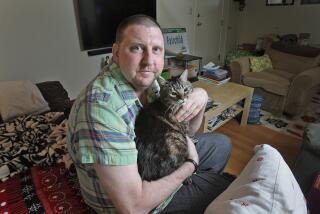Colombian Doctors May Offer Euthanasia as Cure
- Share via
BOGOTA, Colombia — Dr. Gustavo Alfonso Quintana felt helpless as cancer spread through his patient, leaving him disfigured, virtually blind and in excruciating pain.
But in Colombia, the only country in Latin America where euthanasia isn’t outlawed, Quintana could bring an end to the 23-year-old student’s suffering.
“He pleaded to be helped to die, saying, ‘I don’t want to wait until I’ve turned into a monster,’ ” Quintana recalled in a rare interview with Associated Press. He said the disease had spread through his groin, lungs and brain.
Quintana would not identify the patient. On the death certificate, he wrote “cardiac arrest,” omitting any reference to the injections that put the man to sleep, paralyzed him and then stopped his heart.
In Colombia, euthanasia became permissible in 1997 when the highest judicial body, the Constitutional Court, ruled 6-3 that an individual could choose to end his life and that doctors couldn’t be prosecuted for their role in helping. The decision came in response to a case in which an opponent of euthanasia had sought to strengthen its prohibition.
The court urged Congress to codify the practice to prevent abuses. Lawmakers, apparently reluctant to take on such an emotionally charged debate in this predominantly Roman Catholic country, still haven’t done so.
But Carlos Gaviria, the judge who wrote the court’s majority ruling, is now a senator, and he plans to submit a bill to Congress to regulate the practice.
“It’s important that we establish clear guidelines,” he said.
Gaviria says he will submit a bill to the legislative session establishing guidelines similar to those in the Netherlands and Belgium, where doctors must seek second opinions, give patients rigorous mental tests before inducing death, and have cases reviewed by government commissions.
In Colombia, there are no such restrictions.
“Currently, it’s solely up to the patient and his doctor to decide on whether to induce death,” said Dr. Juan Mendoza, head of Right to Die with Dignity, an activist group. “There is no legal obligation even to report it to authorities.”
Because no records are kept, no figures exist on how many doctor-assisted suicides have occurred in Colombia.
The issue has received little public attention in Colombia, but Gaviria’s bill is expected to change that. Colombians are evenly split on the subject, with 45% in favor of inducing death in terminal cases and 46.9% against, according to a Yanhaas poll for RCN radio. The poll, released in March, had a 4 percentage point margin of error.
The Catholic Church, which tried unsuccessfully to have the court ruling overturned, says it won’t stay on the sidelines.
“We will make our opinions heard, through the press or communiques and public appeals,” said Msgr. Juan Vicente Cordoba, auxiliary bishop of the northern city of Bucaramanga and a bioethics expert. “We have always urged all Catholics to have nothing to do with euthanasia, as life belongs to God.”
In 90% Catholic Colombia, the church has strong influence on legislators, but the role of Congress is to draw up rules and regulations to prevent abuses, not to change the core of the court’s ruling. To do that it would have to change the constitution itself.
Quintana says he has performed euthanasia on about 15 patients and wants the practice to remain a matter between doctor and patient.
More to Read
Sign up for Essential California
The most important California stories and recommendations in your inbox every morning.
You may occasionally receive promotional content from the Los Angeles Times.













